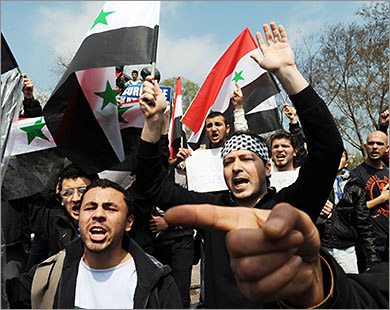Syria faced growing international pressure Monday, with the European Union imposing fresh sanctions and Jordan's king condemning the regime's crackdown on protesters and calling on President Bashar al-Assad to step down, dpa reported.
King Abdullah of Jordan said in an interview to the BBC that if al-Assad really had the interest of his country at heart, he would step down.
"I would step down and make sure whoever comes behind me has the ability to change the status quo that we're seeing," Abdullah said.
In Brussels, meanwhile, EU foreign ministers agreed to add 18 Syrian officials "responsible for human rights violations" to an existing sanctions blacklist.
In addition, existing loans and technical assistance agreements between Syria and the European Investment Bank were frozen.
The decision was to enter into force on Tuesday, along with a previously agreed ban on foreign oil investments.
The latest developments came two days after the Arab League decided to suspend Syria from its meetings until it had been found to comply with a proposed Arab peace initiative for the country.
Al-Assad's government has been accused of failing to fulfill its commitments under the plan, which calls for the withdrawal of the military from civilian areas, talks with the opposition, the release of political prisoners and access to the country for human rights groups and the international media.
The Arab League has given Syria until Wednesday to comply or face unspecified political and economic sanctions.
However, Damascus remained defiant, describing the Arab bloc's decision as "illegitimate" and "dangerous."
Syria's permanent representative to the Arab League was present when the announcement was made on Saturday.
But according to Foreign Minister Walid al-Moallem, Arab League officials had made their decision more than a month ago during a meeting in a Cairo hotel.
He also criticized the Arab League's relations with the United States, which he accused of inciting violence in Syria.
"The Arab League said it worked for stopping the violence in Syria and said the US is not a member of the Arab League ... but they are an unofficial member," al-Moallem told a press conference in Damascus.
Damascus received the backing of Russia, when Foreign Minister Sergei Lavrov accused Western nations of illicitly providing arms to Syria's opposition.
"Nobody is commenting on it and no one is admitting it, but the facts are impossible to contradict: weapons are being smuggled into Syria from Turkey and Iraq," Lavrov was quoted by the Interfax news agency as saying.
The Syrian president later thanked "Russia and the Russian people who took the side of the Syrian people" during a meeting with Patriarch Kirill, head of the Russian Orthodox Church.
Meanwhile, an Arab aid group said Arab League Secretary General Nabil al-Arabi had informed them that Damascus had agreed to let monitors inside the country.
Ibrahim al-Zaafarani of the Arab Doctors Union said that al-Arabi was in talks with 16 rights groups to form a delegation of 500 observers, including military personnel, to travel to Syria.
The Arab League decision has angered al-Assad supporters, who in response attacked several embassies in the country, including those of France, Qatar, Saudi Arabia and Turkey.
"I, as foreign minister, apologies for this matter," al-Moallem later said. "It is important ... that this does not repeat itself. The protection of the embassies is part of our responsibilities."
A further 12 people were killed Monday in the restive city of Homs when government troops shelled the city's Baba Amr neighbourhood to prevent demonstrators from taking to the streets, a local activist, Ahmad al-Homsi, told dpa by phone.
Al-Homsi added that more than 20 people had been injured.
More than 3,500 people have been killed in Syria since pro-democracy protests began in mid-March, according to the UN.






